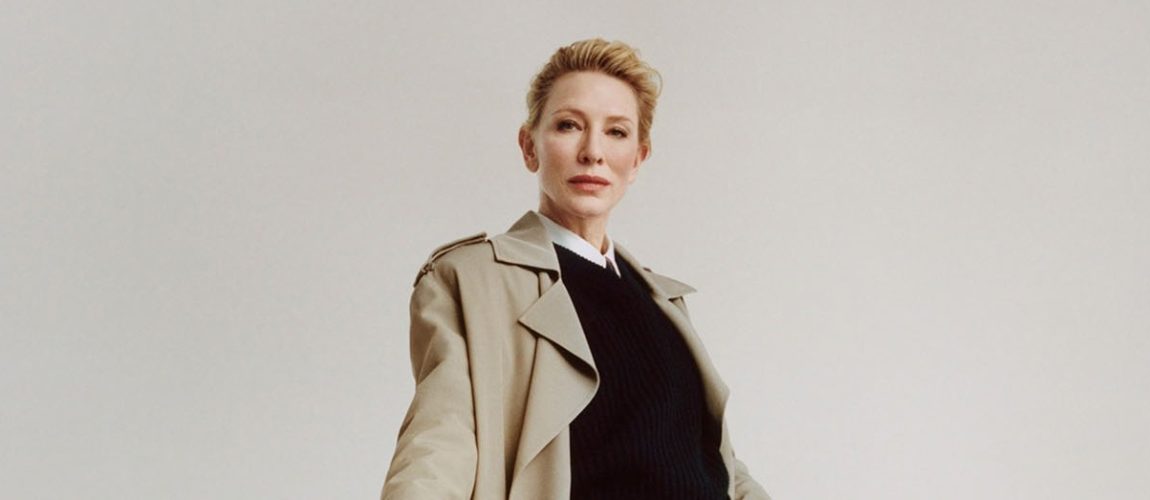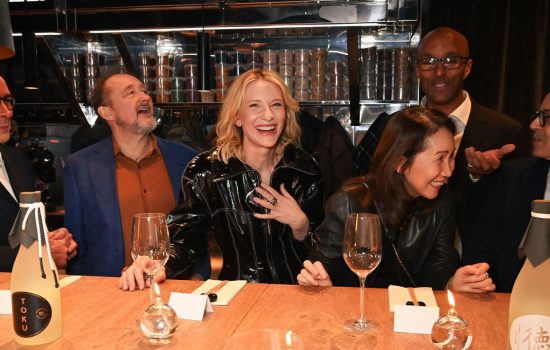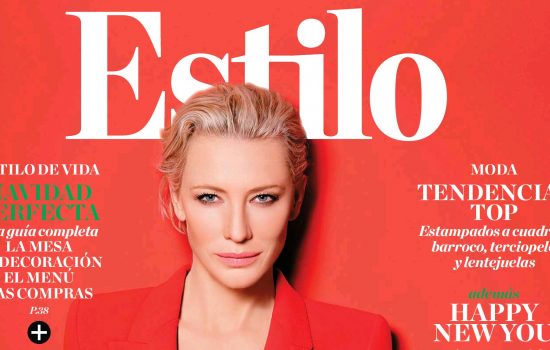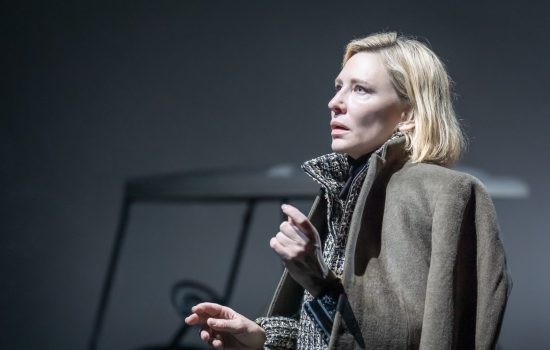The recipients of Displacement Film Fund which was spearheaded by Cate Blanchett and International Film Festival Rotterdam’s Hubert Bals Fund have been unveiled. Cate will be at the upcoming Cannes Film Festival to join the panel that would discuss the film fund, the selected films and their filmmakers, and actions in support of displaced filmmakers on 23 May.
Family Style published a preview for their Spring 2025 issue, Cate is in conversation with author Ottessa Moshfegh. You can pre-order a copy here.
Displacement Film Fund
Cate Blanchett and the International Film Festival Rotterdam’s Hubert Bals Fund have announced the five recipients of the Displacement Film Fund, a new short film grant scheme first unveiled during the 2025 edition of the festival earlier this year.
Spearheaded by actor and producer Blanchett, who is also a Global Goodwill Ambassador for UN refugee agency UNHCR, together with IFFR’s Hubert Bals Fund, the initiative aims to champion and fund the work of displaced filmmakers, or filmmakers with a proven track record in creating authentic storytelling about the experiences of displaced people.
In this pilot version of the Fund – which is backed by a coalition of leading film industry experts, creators, business leaders and philanthropists – each of the nominated filmmakers will be bestowed with a production grant of €100,000. The completed projects will have their World Premieres at IFFR 2026.
The five recipient filmmakers and their projects are Silk Road by Maryna Er Gorbach (Ukraine), Whispers of a Burning Scent by Mo Harawe (Somalia, Austria), Allies in Exile by Hasan Kattan (Syria), an untitled project by Mohamad Rasoulof (Iran), and Female Fitness of Kabul by Shahrbanoo Sadat (Afghanistan).
“Displacement may disrupt careers, but for artists it doesn’t diminish the drive to tell urgent, human stories. In a time of growing division, film offers a powerful counterforce to remind us of our shared humanity. I can’t wait to see what these exceptional filmmakers bring to life – whether addressing displacement directly, or exploring the universal threads that unite us,” said Blanchett.
Blanchett will join Er Gorbach and Harawe, and Rajendra Roy, Chief Curator of Film at the The Museum of Modern Art (NY), in a panel event at the Cannes Film Festival, hosted by IFFR Managing Director to Clare Stewart to address the evolution and purpose of the fund, the recipient filmmakers and their projects, and wider industry actions in support of displaced filmmakers.
Rajendra Roy is also Co-Chair of the International Film Award Executive Committee, Academy of Motion Picture Arts and Sciences which recently announced that Academy Award® eligibility for the Best International Feature Film Award has been expanded to include filmmakers with refugee or asylum status.
“The Displacement Film Fund responds to the urgency of a growing global crisis, and is underpinned by a belief that film continues to be a force for positive change,” said Clare Stewart, and Tamara Tatishvili, Head of the Hubert Bals Fund. “The HBF is committed to supporting funding that creates an impact, and the Displacement Film Fund aligns perfectly with the HBF’s mission and legacy. We are honoured to be entrusted with the management of this fund, and to work with these exceptional filmmakers to support the realisation of their projects.”
Commenting on the Cannes Film Festival’s hosting of the panel event, Delegate General Thierry Frémaux said: “The Cannes Film Festival is proud and honoured to host the Displacement Film Fund panel, giving voice to artists whose journeys have been marked by exile and displacement. By embracing their perspectives, the Festival reaffirms — more than ever — its role as a refuge: a home for those who see cinema as a free and universal act, one that transmits, resists, and bears witness to the world around us.”
For the Displacement Film Fund’s selection process, a longlist of filmmakers was determined by the Nominations Committee, which included founding members Cate Blanchett, Isaac Kwaku Fokuo, Echo Quan, Ke Huy Quan, Ayman Tamer, and Koji Yanai, together with Droom en Daad’s Wim Pijbes, IFFR’s Clare Stewart and HBF’s Tamara Tatishvili.
The Founding Partners of the Displacement Film Fund’s pilot scheme are Master Mind, Uniqlo, Droom en Daad, the Tamer Family Foundation and Amahoro Coalition whose generous contributions enabled the scheme. The HBF is the Management Partner and UNHCR, the UN Refugee Agency, is supporting the project as Strategic Partner.
You can read more about the selections here.
Cate Blanchett in conversation with Ottessa Moshfegh
Ottessa Moshfegh: I loved Black Bag. It is such a delicious film. On the simplest level, the competency of the characters is so thrilling right now because we’re just surrounded by so much incompetency.
Cate Blanchett: I always look at the disjunction between what a character says and what they do: where they move, who they choose to speak to, what words they use, what objects they pick up, or people they discard. It’s as much what they don’t say as what they say. A script is like a template—even if the entire thing is improvised, there will be markers in the sand. Certain events need to happen or certain people come into the story or exit. But you can only have the end in mind as if it were a dream. When you’re setting out to write something, how much do you allow the flow of the moment to take you in a direction away from your structure?
OM: When I first understand that I must write something, I hear it before it is actually words; it’ll be a weird sound, and I’ll be like, I think the word is…
CB: As if it’s a conversation heard underwater?
OM: Exactly. Sometimes it’s even more abstract than a sound, it’s like a gesture or the movement of air or a feeling. I’m obsessed with control and when I can lose control and let writing happen. This is a very interior process, but I’ve learned at this point when not to be a perfectionist and when to zone out. I can observe and allow things to happen naturally, and then at the same time coordinate with my instinct to go back, do it again, say it another way.
CB: I feel like I’m full of randomness and contradictions and inconsistencies at the moment, which I don’t really want to be accountable for. When you’re working on something, you end up seeing things through the lens of the material that you’re working on, which is a gift in many ways. But it can also mean that I can feel a bit absent to people. Everything that you’ve experienced during the day doesn’t disappear. It’s still swirling around you. I love that onstage you can be profoundly present but also have an alert sense of the other layers of time and reality. I am wildly open because I have to allow everything in and everything out. It’s an extraordinary feeling. Are you like that when you sit down to write? Are there certain things that you like—ideas or situations or environments—that you set up for yourself? Are they different to each story?
OM: It’s like getting a phone call at the beginning. Then eventually when I understand what’s being asked of me, I come up with a discipline around what I’m doing. Sometimes it’s very controlled, and sometimes it’s more fluid. The book that I’m working on is based in a place kind of like Brighton in England. I didn’t know that it was Brighton nor had I been to Brighton when I started writing the book. Then when I went, I could identify it as the place. Now I’ve been back three times, and each time I go I need to have a flat on the third or fourth floor with a view of the sea. That’s the only requirement, and it’s because the character lives there so I have to be there. I believe in putting yourself in the right situation. I don’t like to be controlled at all. As a writer, I am in competition with an idea of the end result, because I don’t want anyone to ever question what I’ve done. At the end of a book, I really have to shut myself down because now my agent and my editor are going to say this and that about it. That surrender feels very complete and permanent every time. When I go back with notes from my publisher, I feel like I’m a secretary. I’m not the same person that wrote the book.
CB: Does that require time?
OM: A lot of it is time. Distance from the thing really helps going back to a draft. Suddenly I can see things more clearly. There’s a million ways that I rewrite and fine-tune things. I also think that it’s like making a pact with the writing gods. When I wrote my first novel, Eileen [2015], I was very, very superstitious. I couldn’t even tell anyone I was writing a novel except for my therapist. I thought if I told anyone I would let some of the pressure out of the system and then it wouldn’t be mine anymore.
CB: There is so much interiority in that book. I think that that is one of the many reasons why so many people love your work, myself included. It’s an act of communion with other people: You allow people to realize they’re not alone. Pretending that we don’t think about what we do, or we don’t fantasize about these things, is deeply human. I imagine that the act of sharing some of those things is kind of antithetical to the state that the character is in. You have to allow them to stew internally, which may not be entirely pleasant. But, once it’s on the page, has it somehow left you? Is there a residue? Does it ever cease to be yours? There’s the sense that you give it over to your readership.
OM: You have to, because you can’t be there reading over people’s shoulders. You have no choice. Something I do control is that I absolutely do not read reviews of my work because I know that the moment it matters to me is the moment that I lose some of my own power to be free—now I have this other person’s voice in my head. Have you ever wanted to direct?
CB: I was going to ask you the same question. I loved what you did with Carey [Mulligan for Prada’s Spring/Summer 2025 campaign]. Listening to you speak about characters just now, I thought, Oh my God, you need to be on set. It is so insightful.
OM: Not yet. I don’t feel quite ready. I studied film and have been obsessed with film since I was a kid, but I’ve never actually been on a set. So I don’t know what it looks like to direct.
CB: Not for Eileen [2023]?
OM: No, because we shot it during Covid, and there could only be this many people in the room. But I would want to direct when it is the right time, with the right project. What about you?
CB: When I was running a theater company with my partner, I loved all of the production meetings, all of the preparatory visuals, the relationship with the set designer, costume designer, and all the production team. I felt such a profound relief on opening night to go into the auditorium instead of onstage. As an actor, you see the story from the margins. I have this ability to defend my character, look at the story from their perspective but also be invested in the whole. I love being part of the whole conversation, setting up a series of propositions, questions for actors. I would die a happy woman in the rehearsal room. Well, I’m never truly happy dying; I love life. I’m not transformed by the set of circumstances that I’m investigating or inhabiting, but I am expanded by them. For the time that you’re working on something, it becomes your frame of reference, and, in a way, a control test. And then sometimes that lingers longer.
CB: I’m fascinated by shame. I remember years ago I was playing Hedda Gabler [in a staging of the play Hedda Gabler by Henrik Ibsen], and I thought, How do you tell this story when shame is no longer a currency in the world? I often think about shame as an opening to possibility for something new and perhaps more evolved to occur. It can be a profound motivator for change.
OM: I agree. Shame is what separates us from monsters.
CB: There’s been moments in your books where I’ve just thought, Thank you so much for not trivializing this or that, but giving it a twist, unashamedly. There are not a lot of forums for constructive conversation, and I think disagreement is healthy.
OM: People will go to great lengths to avoid shame or admit that they are ashamed in front of someone. And the theatrics of that denial and dancing around it are what’s fascinating to me. I see men struggling with shame more than I do women right now. There’s a lot of finger-pointing going on, and a lot of fuming.
CB: But shaming people is pretty fruitless; you have to feel it yourself. It’s quite personal, isn’t it? It’s quite interior. It’s something between you and whatever you call your god.
You can read the full conversation on Family Style









 A Manual for Cleaning Women (202?)
A Manual for Cleaning Women (202?) Father Mother Brother Sister (2025)
Father Mother Brother Sister (2025)  Black Bag (2025)
Black Bag (2025)  The Seagull (2025)
The Seagull (2025) Bozo Over Roses (2025)
Bozo Over Roses (2025) Disclaimer (2024)
Disclaimer (2024)  Rumours (2024)
Rumours (2024)  Borderlands (2024)
Borderlands (2024)  The New Boy (2023)
The New Boy (2023) 











